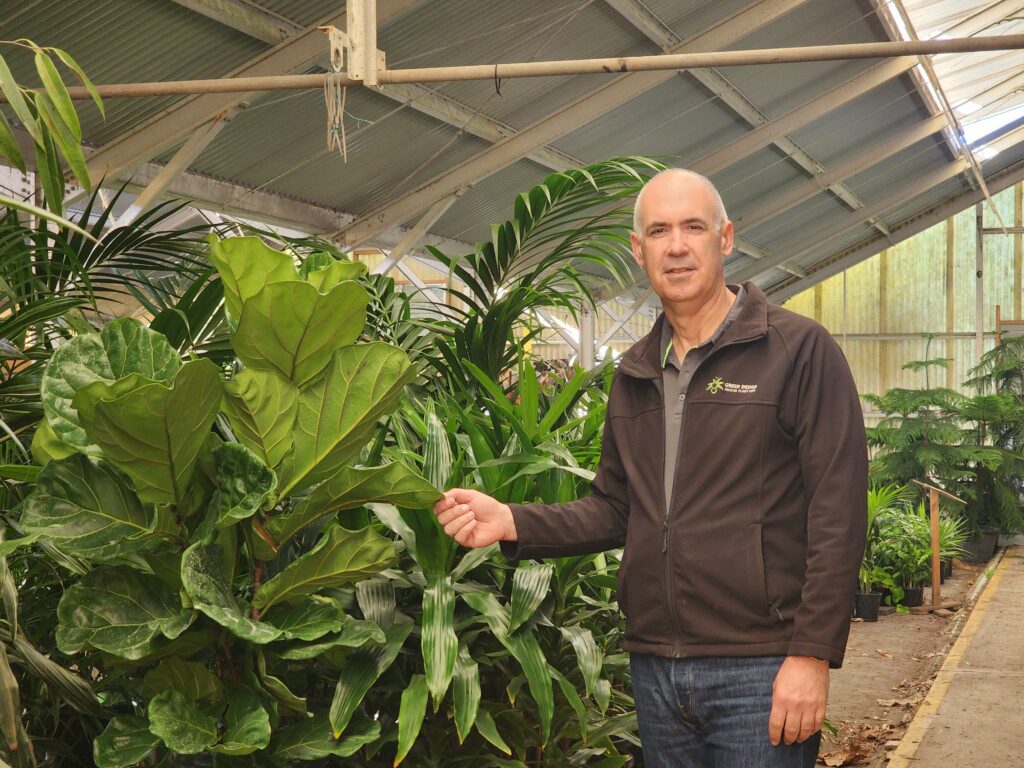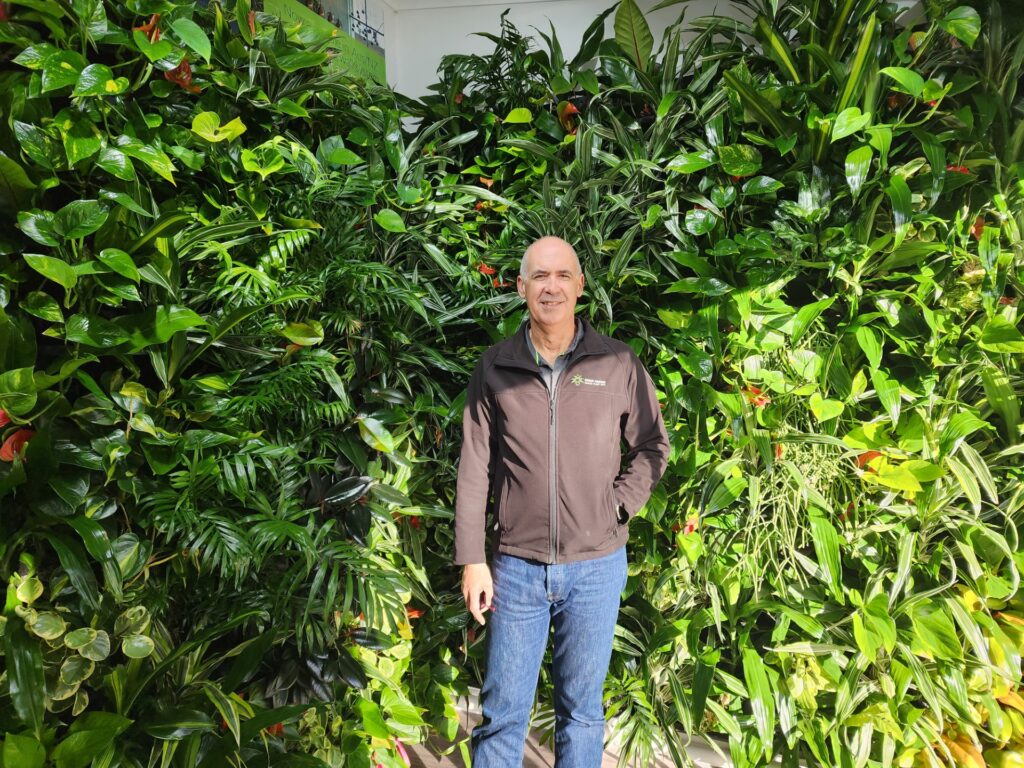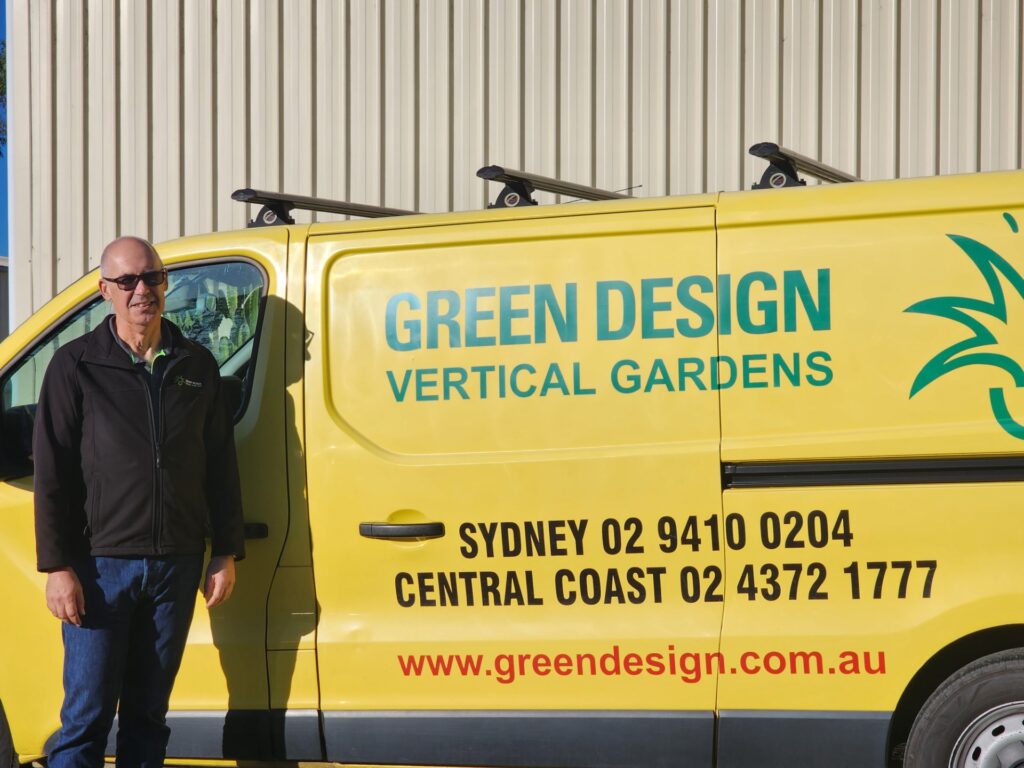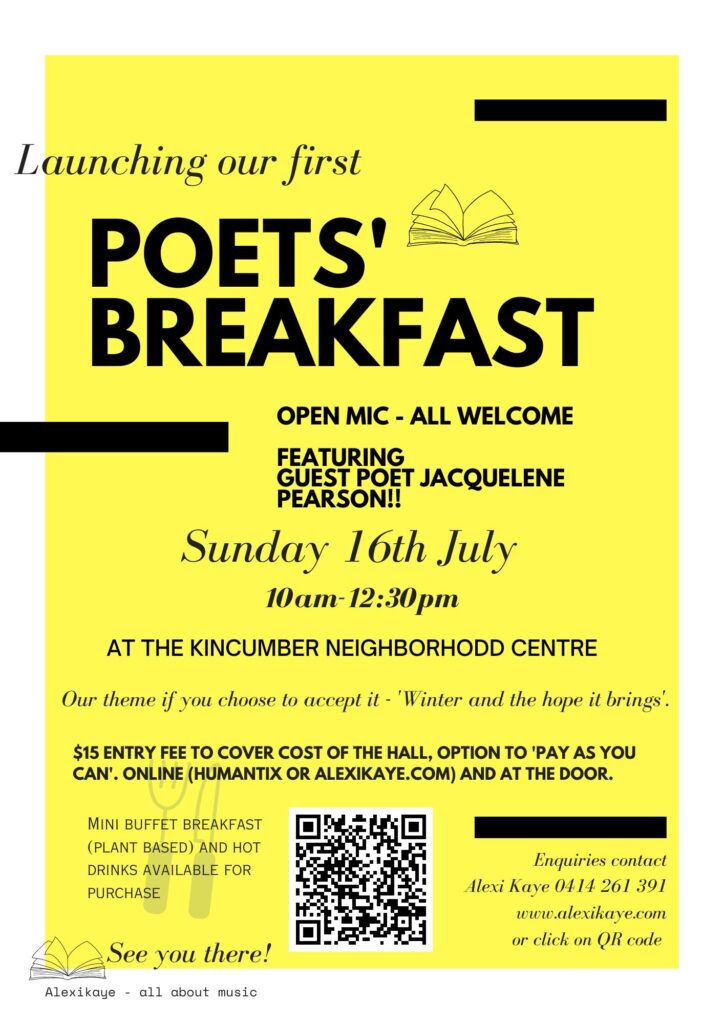Businesses across the Central Coast are quietly taking their responsibilities to the planet very seriously – this week The Point talks to Ray Borg, General Manager of Green Design Indoor Plant Hire at Somersby about plants, solar panels and being a good corporate citizen.

By Jacquelene Pearson
“Biophilia – look it up,” Ray Borg urges me, part way through our conversation about the benefits of plants in the workplace. “It is the relationship between humans and our desire to be with nature,” he explains. I promise I will investigate it.
According to Psychology Today, Biophilia describes the human drive to connect with nature and other living things. “Nature’s power for humanity can influence our mental health, our hobbies, our travels, and our homes and workplaces. https://www.psychologytoday.com/us/basics/biophilia
“If biophilia delivers benefits to humans, then our increased distance and detachment from the natural world, due to urbanization, technological advances, and other factors, could have negative effects on our well-being—not to mention on nature itself.”
It would appear that the owners of Green Design Indoor Plant Hire Rudy and Robyn Ursem understood biophilia 40 years ago when they bought a small business that has now grown into a thriving operation with a staff of 45.
“You could say they have added an extra staff member every year of operation,” Ray Borg says.
It’s a family affair at Somersby, where a daughter, son and son-in-law all work in the business, which started in Kincumber and has always been located on the Central Coast.
“In 1982 the industry was quite a cottage industry back them. A lot of wicker baskets. I got introduced in 2001 and it was still a cottage industry then. It wasn’t an industry that was well known. You really had to sell plants into businesses back then. It was hard to find businesses who understood the benefits of plants,” Borg says.
“The change that has happened because of the greening of, and what we try to do with, the indoor environment has changed dramatically with a huge shift in perception of what we need to have indoors and the benefits.”
According to Borg, plants in offices these days are as essential as desk, laptop and telephone. Just as you didn’t see coffee machines in offices decades ago, plants weren’t that common either. Now they are everywhere.

Borg says there are no “indoor plants” but simply plants that can tolerate low light.
“There is no such thing as an indoor plant but there is such a thing as a plant that can tolerate low light,” he says.
The market changed about 15 years ago when the industry started educating clients about the importance of plants.
“Further back NASA did a lot of research on plants indoors and how they remove Volatile Organic Compounds, formaldehyde, toluene, benzene, carpets, flooring, old paints, glues in furniture. A lot of furniture and paints, even floor coverings have what you call off gas. The industry with the help of UTS was able to prove that plants in offices and buildings help remove those nasties, which are also carcinogens.
“We also got the Green Buildings Council onside, and they are quite progressive and all over the world. Back then we were able to get them to understand the importance.”
Buildings are given star ratings for design, building materials, reuse and recycling of materials – the highest rating has been six stars.
Other factors that contribute to high star ratings include how a building is maintained and run, its interior fittings, energy use and how well it looks after its inhabitants.
“The Industry was able to get the council to recognise the importance of plants. You need a score of 75/100 for six stars and you can be allocated two points for plants in buildings so it is quite a cheap way of getting two points.
“That happened in about 2007 and since then traction has been developing to the point where now people just recognise the importance of plants inside.”
The UTS has just released another paper on how plants can remove chemicals that come from petrol based fumes.
Ray Borg says petrol fumes in buildings are now a big issue because residential buildings have many basement car spaces.
“The more plants, the more chance of removing those chemicals.”
Strong competition
Borg describes the indoor plant hire business as “very competitive” and he should know as president of the Australia and New Zealand Plantscape Association, the official industry body.
“Along with the UTS we really try and promote the benefits of plants.”
Every client or potential client has their own style.
“In most cases we will be sent a floor plan, we will have a look at the space and scope what will work in the space.
“If the building is already built we will go and have a look, understand what the company is trying to achieve. They might want a real jungle effect or minimal or they might just be trying to get two points in their star rating.”
Quite a few factors are taken into consideration – plants are matched to location – for instance, bulky plants will be avoided in high traffic areas.
“Lighting is very very important because plants are just like us; the sunluight is their food so they are not going to last long without light.”
Green Design have a maintenance program that involves checking on plants they have placed in buildings once a month or every five weeks.
“Green Design use a water reservoir so the plants feed themselves. The system we have got allows the plant to regulate what it takes. It is a very simple way it works so there’s no maintenance for the client. We come in water it, look after it, trim it, feed it if it needs a feed.
“All plants eventually die,” Borg explains.
“It is like hiring a car. You don’t do anything with it other than just use it. If we think a plant is looking a bit sick, we replace it. Air conditioning at this time of the year.”
Most of the plants hired out by Green Design are grown in Queensland and Northern NSW but will be stored at Somersby.
This one company has “tens of thousands of plants” in buildings across Sydney, Central Coast and Newcastle.
“We do have some national accounts that we look after through affiliates in all our capital cities.
If you talk about all the people who supply us, all the nurseries, the delivery vehicles, we’re a substantial business.
Walls
Borg says Europe is well ahead of us in regard to external walls.
“The industry did itself a disservice in the sense that a lot of people jumped into green walls. They said ‘we can put it there and forget about it’ but you will see a lot of walls that are dead. Builders, architects and providers have figured out that you have to maintain them. Yes, you can put a wall up but you have really got give it some TLC.
“We have got a client who is a multinational that has plants everywhere. They have a room with 20 plants in it with four seats and four lounges and so the staff can get in there and just chill out. It is a de-stressing room. That is probably a good example of plants being used to the maximum. There was more space for the plants than there was for the humans.”
Most business now consider it essential to have a plant on every desk or at every work station. The greenery is now built into the office furniture.
COVID reinforced need
“It has been quite a good couple of years and not just for us but for the whole industry. The industry has not been keeping up with the demand,” Borg says.
“Especially in the last 12 months I think a lot of people have been trying to get their staff back and they have been putting more into enticing people back into their offices,” he says.
“One of the clients has built a massive garden, probably 10 x 3 metres in the middle of the office.”
Green Design Indoor Plant Hire has between 18 and 20 vans out on the road delivering and servicing plants on any given day.
Net zero
The company has been investing heavily in trying to get to net zero carbon emissions in its activities.
“We’ve got solar on quite a few rooftops. We are not quite neutral on our energy usage but pretty close.
Our sales cars have been moving into hybrids.
“Rudy has got a passion for trying to do the right thing for the environment. We are in the green space so we are all trying to do the right thing. We are making sure all our decorative pots can be recycled, some are made out of old fishing nets. Some have been around for 20 years because we have either resprayed or they can be recycled.
“With the plastic grow pots from nurseries, we now have a system where people who supply take them back, regrind them and make new ones.
“We have stopped using river pebbles so we have made a call on that but what we do now is rewashing and reusing the pebbles. We stopped throwing them away.”
Health benefits
“We could write another paper on the benefits of plants from a psychological point of view,” Born says. “The physiological benefit is they remove carbon dioxide so you don’t get that 3pm sleepiness because the CO2 has been removed from the air.
“Many studies have proven that plants in offices have improved productivity. We all know that when you go on holidays you go outdoors.
“You walk into a place that’s dull or it is even nice, they’ve done all this work and you bring the plants in and the plants just lift it and you can see people’s happiness changes, and they have smiles on their faces. It really makes a difference.”

Charitable giving
“The other part of the CSR is our work with charities,” Borg explains. “We are doing work with Ronald McDonald house in Newcastle and we just went to Tamworth and Forster and put plants in their houses up there. It is great to see what you can do to an environment where you’ve got sick kids and parents looking after them.
“If you look at the Ronald McDonald House they are near a hospital and their philosophy is to give support to children and parents but only 15-20 per cent of their funds come from McDonalds.”
Activities include a Charity ball in Newcastle and sending staff to Lovin from the Oven.
“Eight girls and guys went up and prepared meals for the people there and they came back with big smiles on their faces. I think we got more out of it than Ronald McDonald house. We are planning to do it again,” he says.
So next time you see a big yellow van full of plants on the M1 take a moment to reflect on this home-grown company’s service to the health of our workplaces and their charitable and environmental endeavours. All in the name of biophilia!



Thanks Jacquelene, good to see positive stories to remind us that more is going right than going wrong.